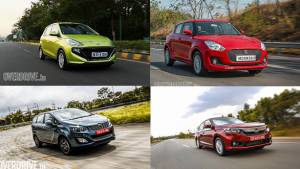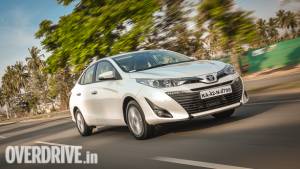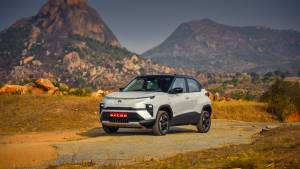Comparison test: Toyota Yaris MT vs Honda City MT vs Hyundai Verna MT
The Honda City is a success story unlike any other sedan in India. It has been around for two decades and has been the best seller for the better part of those twenty years. In fact it is only last year that Hyundai managed to pose a serious threat to it with the new Verna. The Verna petrol automatic also won our comparison test with the City automatic, which speaks a lot about how Hyundai has upped its game. But now, the City (and the Verna too) must fend off a fresh challenge, from the Toyota Yaris.
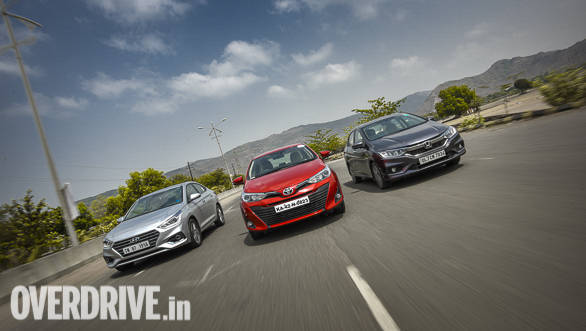 The Toyota Yaris is the newest entrant of what is probably the most important 'executive' class of sedans in the country. The Honda City's long standing reputation and the latest generation Hyundai's brilliant packaging are what the Toyota needs to tackle
The Toyota Yaris is the newest entrant of what is probably the most important 'executive' class of sedans in the country. The Honda City's long standing reputation and the latest generation Hyundai's brilliant packaging are what the Toyota needs to tackle
As a brand, Toyota stands for bulletproof reliability and excellent comfort, virtues that have had buyers hold the brand in high esteem for really long. It was thus a given that when launched, the Yaris will ruffle a few feathers. And now that it's here, it is time for a face off against the Honda City and Hyundai Verna. Given that the good old manual gearbox still a thing, we thought it's best to let the petrol powered, manual versions of the three cars slug it out against each other.
Design and engineering
Let's face it, all three cars are good looking. In fact, despite being around for a good five years the current generation Honda City still looks very handsome. LED headlights accentuate the design's sharpness while the sharply raked windscreen gives the front a dash of sportiness, though the rear has started looking dated now. The Yaris meanwhile follows Toyota's conservative approach. The styling isn't aggressive and Toyota has played it 'safe' once again. You cannot dislike the face but at the same time the design does not stand out in this company. I'm not a fan of Yaris's high-set headlights and tail lamps either and I also wish the gap in the wheel wells not as big as it is.
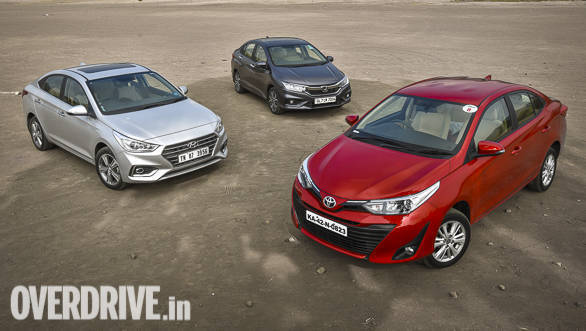 The styling of the Toyota Yaris is 'safe', just like most other cars from the Japanese manufacturer. The Hyundai Verna is the most dynamic and aggressive looking of the lot, while the current generation Honda City looks good thanks to the facelift it got last year, despite being five years old originally
The styling of the Toyota Yaris is 'safe', just like most other cars from the Japanese manufacturer. The Hyundai Verna is the most dynamic and aggressive looking of the lot, while the current generation Honda City looks good thanks to the facelift it got last year, despite being five years old originally
The Verna looks very European and more upmarket on the other hand with its rakish looking headlights, sharp grille and aggressively styled front bumper. The design and positioning of the tail lights is the piece de resistance though, thanks to the intricately styled LED clusters. The Verna is the best looking car here then fresh, bold and aggressive. All three cars boast solid build quality, premium paint finishes and high fit-finish levels with pretty much no chance to complain on the build quality front and are matched evenly.
Interiors and space
I have to give it to the Honda City in this department, be it for the sportiness of the beige-black interiors or the space. The dashboard looks particularly appealing with its black-grey plastics and I also like the 7.9-inch touchscreen's gloss black surrounds, as they make it look bigger. The flip side? The gloss black panel is a dust magnet. The Honda is the most spacious car in this test, particularly at the rear, as it boasts more leg and kneeroom by a significant margin. And the City's beige-hued seats accentuate that feeling further.
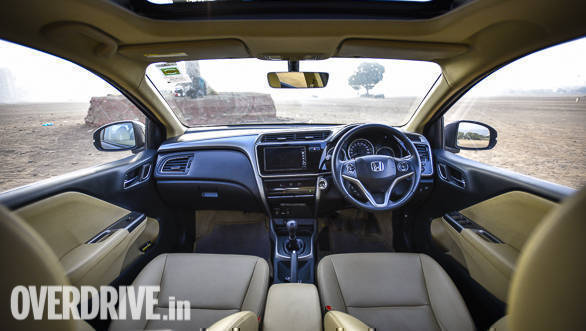 The Honda City's interiors feel premium and airy thanks to Honda's 'man-maximum, machine-minimum' philosophy. Notice how spaced out the cabin looks, while the beige leather seats make for a very spacious and cheerful feel
The Honda City's interiors feel premium and airy thanks to Honda's 'man-maximum, machine-minimum' philosophy. Notice how spaced out the cabin looks, while the beige leather seats make for a very spacious and cheerful feel
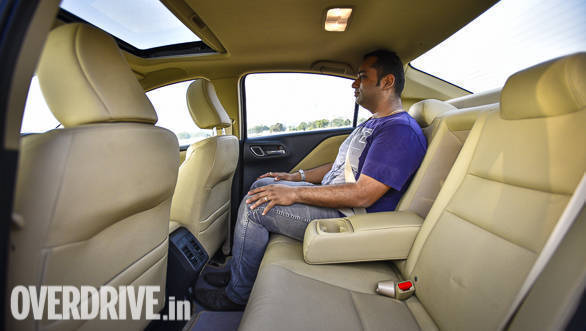 The Honda City is also the most spacious of the three at the rear, offering the maximum legroom and kneeroom
The Honda City is also the most spacious of the three at the rear, offering the maximum legroom and kneeroom
The Yaris also sports a beige-black-grey combination inside, but the lighter shade of its grey does not look as classy. Quality of plastics is good but the dash layout doesn't feel very premium, neither does it feel as spaced out as the City's. The steering wheel in the Yaris is large with a thick rim and I would have liked a slightly smaller wheel. What's more, despite being the second most expensive variant in the Yaris line-up, the V version you see here makes do with fabric upholstery unlike the VX variant of the Honda City here that gets leather seat covers. The Verna gets leather upholstery, but only on the top variant again.
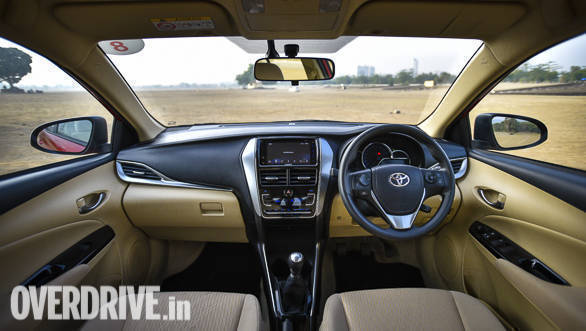 The cabin and dashboard layout in the Toyota Yaris isn't as appealing as the Honda City, and it does not feel as spacious either
The cabin and dashboard layout in the Toyota Yaris isn't as appealing as the Honda City, and it does not feel as spacious either
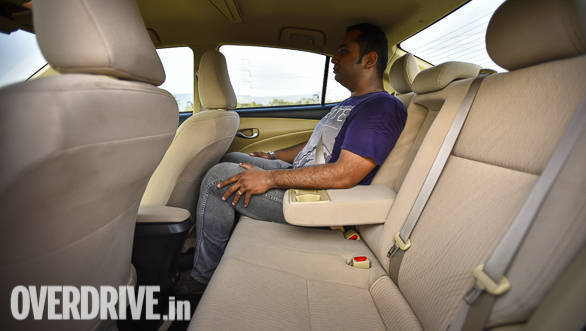 Rear leg and kneeroom in the Toyota Yaris is constrained as compared to the Honda City and headroom isn't lesser as well. But the Yaris gets roof mounted rear air-conditioning vents which are excellent in terms of channeling air onto rear seat occupants
Rear leg and kneeroom in the Toyota Yaris is constrained as compared to the Honda City and headroom isn't lesser as well. But the Yaris gets roof mounted rear air-conditioning vents which are excellent in terms of channeling air onto rear seat occupants
The Yaris also does not feel as spacious as the City. The front passenger area feels slightly cramped in comparison and there's barely any space for the driver to rest his left foot in the foot well. The Yaris loses out to the City by a bigger margin in terms of rear space, as its cabin simply does not offer as much leg and kneeroom. What I did like about the Toyota's rear seat though was the angle of the seatback and the seat's contours which make it comfortable. But then, the Yaris isn't exactly a five seater like the City, and egress from the backseat isn't easy too, as the B-pillar restricts movement for your feet. The Yaris also offers the least amount of headroom at the rear at nearly six feet tall I had my hair brush against the roof in the City and Verna but in the Yaris I could feel my head touching the roof.
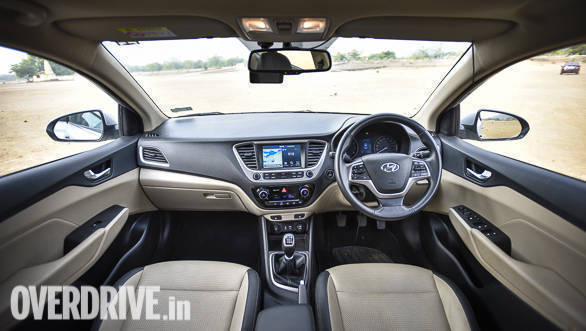 The Hyundai Verna's cabin also gets a beige-black theme and while quality of plastics is excellent, just like the Honda City and Toyota Yaris, the overall design of the dashboard isn't as appealing and the cockpit doesn't feel as spacious as the Honda either
The Hyundai Verna's cabin also gets a beige-black theme and while quality of plastics is excellent, just like the Honda City and Toyota Yaris, the overall design of the dashboard isn't as appealing and the cockpit doesn't feel as spacious as the Honda either
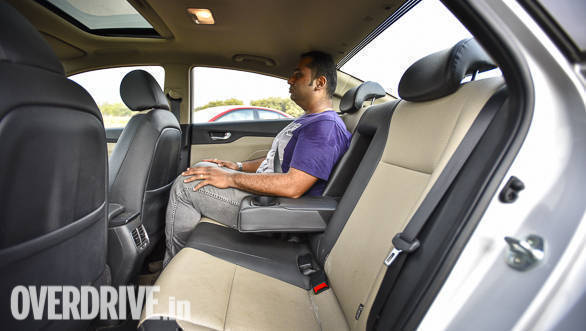 The Hyundai Verna isn't as spacious as the Honda City at the rear and also lacks the airy, roomy feel offered by the Honda City and Toyota Yaris both
The Hyundai Verna isn't as spacious as the Honda City at the rear and also lacks the airy, roomy feel offered by the Honda City and Toyota Yaris both
The Verna's interiors follow the black-beige theme as well, and while I didn't particularly like the dashboard layout Rohit seems to like the design. The infotainment screen is a 7-inch unit but looks smaller, as it is flanked by air-conditioning vents and unlike the other two screens the Verna's unit is also more prone to picking up finger prints. Talking about the rear bench, the Verna only manages to feel as spacious as the Yaris but no match for the City. The Verna's boot is also the smallest, followed by the Yaris, while the City has the biggest boot here.
Feature and equipment levels
All three cars boast elaborate feature lists, but each car has some features exclusive to it. For instance the top of the line variant of the Verna features ventilated seats which is a boon in Indian summers. The Yaris has the longest equipment list, though several features are on offer only in the top of the line VX variant. The Yaris also betters the Verna and City on the safety front, as it comes equipped with 7 airbags as standard. The City and Verna only get two as standard and even their top variants get six airbags only. The V and VX variants of the Yaris get disc brakes all around, unlike the City and Verna that do not offer the option.
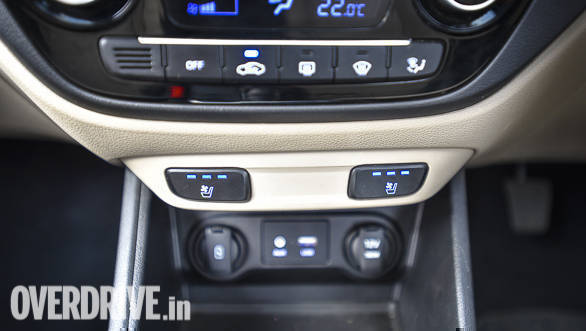 The Hyundai Verna's ventilated seats are a boon in Indian summers and a definite highlight on the Verna's feature list
The Hyundai Verna's ventilated seats are a boon in Indian summers and a definite highlight on the Verna's feature list
The Yaris is also the only car in this test to come equipped with front parking sensors while its infotainment system offers gesture control, a first in the segment. One of the biggest highlights inside the Yaris cabin though are its roof-mounted rear air-conditioning vents. Having spent time in its rear seat I can confirm the vents do a better job of cooling the cabin as compared to the rear air-con vents in the City and Verna both. That however means that the Yaris does not get the option of a sunroof, unlike the City and Verna. In our books though, the roof-mounted air-conditioning vents are the more practical offering.
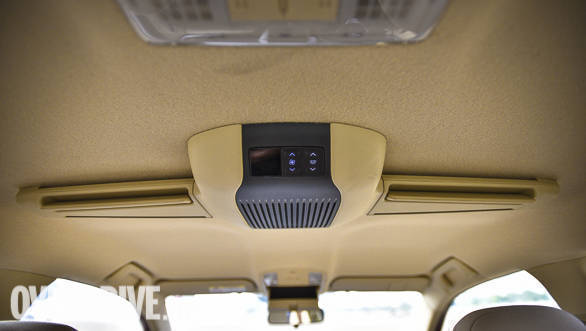 The Toyota Yaris does not get a sunroof like the Honda City and Hyundai Verna due to its roof-mounted air-conditioning vents, but the vents are a more practical offering as compared to sunroofs
The Toyota Yaris does not get a sunroof like the Honda City and Hyundai Verna due to its roof-mounted air-conditioning vents, but the vents are a more practical offering as compared to sunroofs
Engines, performance and efficiency
The Verna has the largest engine and highest outputs in this test, as its 1.6-litre engine offers 123PS and 151Nm. The City and Yaris are both powered by 1.5-litre engines. The Honda offers 119PS and 145Nm, while the Toyota is the least powerful at 107PS and 140Nm. The Yaris was the slowest in our acceleration tests, taking 12.37 seconds to get to 100kmph. The City is the quickest and clocked 10.85 seconds while the Verna is slower by just three-tenths at 10.88 seconds. That said, the Yaris does not feel excruciatingly slow thanks to the way its engine builds revs and its sporty exhaust note.
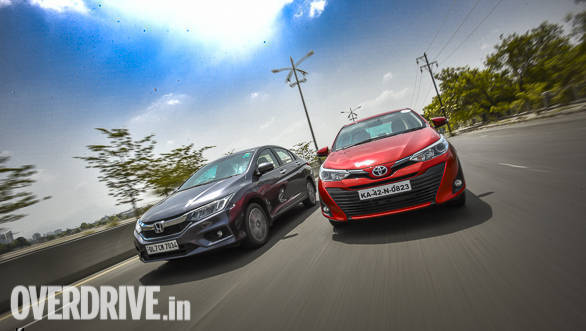 The Honda City is the quickest accelerating car of the three while the Toyota Yaris is the slowest, though it does not feel very slow thanks to how quickly its engine build revs, as also its sporty exhaust note
The Honda City is the quickest accelerating car of the three while the Toyota Yaris is the slowest, though it does not feel very slow thanks to how quickly its engine build revs, as also its sporty exhaust note
All three engines are excellent in terms of refinement and smoothness but the City takes the cake here. It also sounds sporty, especially once VTEC kicks in and the Honda engine is my favourite given its eagerness to build revs. The Hyundai and Toyota motors are up there in terms of refinement but aren't as quick to rev. The Honda gearbox is also the slickest shifts slot in precisely with a reassuring click. The Verna's gearbox simply isn't as slick, while the Toyota 'box has a notchy feel, especially when downshifting from third to second.
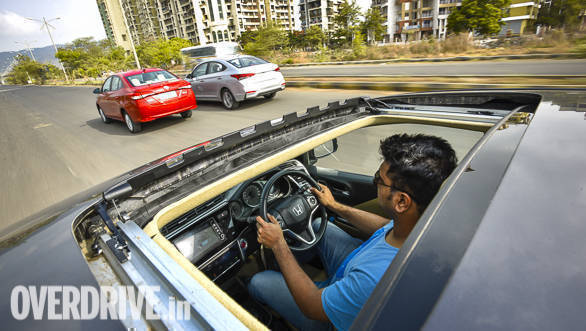 The Honda City has the best gearbox of the three with its slick, precise feel as also the way the gears slot in. The gearbox in the Toyota Yaris feels slightly notchy, while shift quality in the Hyundai Verna simply isn't as impressive as the City, though gears do slot in well
The Honda City has the best gearbox of the three with its slick, precise feel as also the way the gears slot in. The gearbox in the Toyota Yaris feels slightly notchy, while shift quality in the Hyundai Verna simply isn't as impressive as the City, though gears do slot in well
But, the City gearbox is a five-speed unit which is a significant disadvantage in terms of fuel efficiency, as both the other cars use six-speed gearboxes. The City managed 8.34kmpl and 15.83kmpl in city and on the highway respectively in our tests, both being the lowest numbers here. The Yaris is the most efficient on the highway, returning 19.53kmpl though the Verna is surprisingly close at 19.1kmpl. The Verna surprised us even more in urban conditions by returning 10.19kmpl, which is higher than the 9.53kmpl the Yaris managed.
Ride and handling
The new Verna is a massive improvement over its predecessor and I am really impressed with how well its suspension handles broken roads. The suspension is also stiffer now which has helped in improving handling and high speed stability. The Yaris one-ups the Verna though, especially when it comes to bump-absorption abilities. Its suspension offered a cushier feel going over the same bumps and the Yaris cabin also felt quieter over the bumps with barely any thuds. That said, the Verna's cabin feels quieter on the go as there was a fair bit of road and tyre noise inside the Yaris cabin.
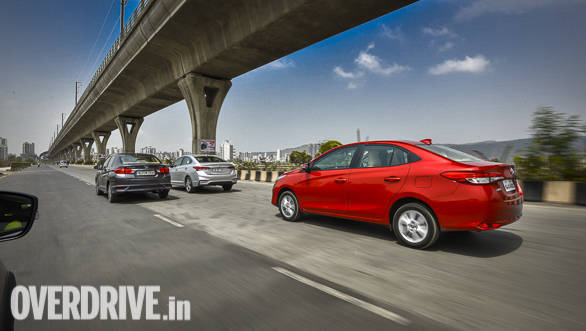 The Toyota Yaris offers the best experience as far as bump absorption abilities are concerned and its handling is sporty too, thanks to the planted, confident feel. The Hyundai Verna offers the quietest experience overall though as NVH levels are well controlled thanks to excellent sound damping. The Honda City has the best steering setup of the three, offering excellent feel and feedback and its handling is sporty courtesy the firmer suspension, but the handling has it trade off ride quality to some extent
The Toyota Yaris offers the best experience as far as bump absorption abilities are concerned and its handling is sporty too, thanks to the planted, confident feel. The Hyundai Verna offers the quietest experience overall though as NVH levels are well controlled thanks to excellent sound damping. The Honda City has the best steering setup of the three, offering excellent feel and feedback and its handling is sporty courtesy the firmer suspension, but the handling has it trade off ride quality to some extent
The Yaris claws back some advantage in terms of handling though, boasting a more confident feel around fast corners and also feeling more planted at speeds. The Yaris thus comes across as a sporty, confident yet comfortable car as you would expect of a Toyota. The City continues to feel as sporty as ever and its handling does not disappoint, but it isn't as impressive as the other two in terms of soaking up bumps and potholes due to slightly tauter suspension setup. Going over the same set of bumps the City's suspension soaked everything reasonably well, but made for a noisier experience. The City thus comes across as the sportiest, though it trades off ride comfort ever so slightly in the process.
But, the City betters the other two cars significantly when it comes steering feel and feedback. Its steering offers a more direct and connected feel which makes it the most communicative of the three. The Yaris comes in second in this department, followed by the Verna. The Verna's steering has improved a lot but it still has an artificial feel, and you know the weightage has been dialed in on purpose. The Yaris also boasts better braking prowess, as it gets disc brakes all round and offers instantaneous bite, followed by the City in second place.
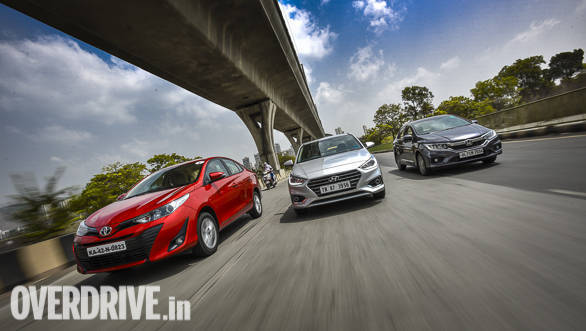 The Honda City, Toyota Yaris and Hyundai Verna are well-built, well-equipped executive sedans and are closely matched to each other on several fronts
The Honda City, Toyota Yaris and Hyundai Verna are well-built, well-equipped executive sedans and are closely matched to each other on several fronts
Verdict
Despite being the oldest car the Honda City has a lot going for it with its sporty demeanour and spaciousness. It continues to woo buyers and also brings with it the trust and reliability the Honda badge is renowned for. That said, the current generation City feels dated on several fronts now, especially in the company of the Yaris and Verna. It desperately needs a six-speed gearbox and higher equipment levels both. The Toyota Yaris is immensely impressive especially when it comes to equipment levels and it also has the best suspension setup. And goes without saying the Yaris is sure to ride high on the Japanese manufacturer's reliability quotient. However, the Hyundai Verna manages to come across as a better package overall. It is just about as spacious as the Yaris (though not as spacious as the City) but more importantly, the Verna matches its Japanese competitors move for move on the dynamics front now.
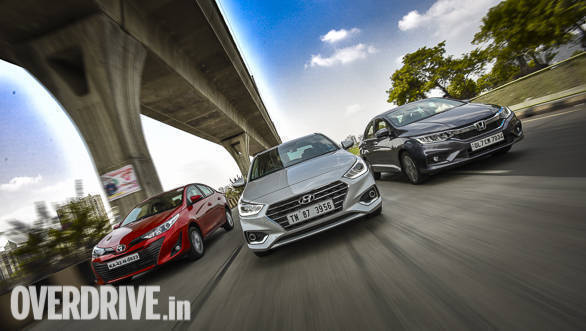 The Hyundai Verna is the best package here overall, but more importantly is also the best value for money of the three as it offers more for less as compared to the Honda City and Toyota Yaris, which helps it win this comparison test
The Hyundai Verna is the best package here overall, but more importantly is also the best value for money of the three as it offers more for less as compared to the Honda City and Toyota Yaris, which helps it win this comparison test
The Hyundai is also the best looking car here which adds to its desirability quotient, beside the fact that it boasts an impressive feature list too. What truly helps the Verna seal the deal though is its pricing. The fully loaded petrol manual version retails at Rs 13.49 lakh on road Mumbai, which is significantly lower than the Yaris VX petrol manual that costs Rs 15.34 lakh. The Honda City VX petrol on the other hand (top of the line ZX is available only with an automatic transmission) costs Rs 13.99 lakh which is higher than the Verna by a small margin. To sum it up, all three cars are pretty closely matched in terms of their packaging but the Verna's yawning price gap to the Yaris and superior equipment levels to the City help it win this comparison test.
Starts Rs 9.29 Lakhs
1496cc
Automatic
107
140
17.8 Kmpl
Starts Rs 10.9 Lakhs
1497cc
Manual
100
145
17.8 Kmpl
Starts Rs 9.31 Lakhs
1493cc
Automatic
115
250
-NA-
